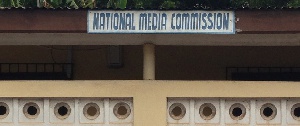We acknowledge the unenviable assignment of the National Media Commission (NMC), especially in the run-up to the general election in November or so.
Even the cynic won’t deny this fact, given the many frequency modulation radio stations dotted across the country – their programmes largely political; some of them are manned by persons with little or no formal training in managing the delicate programmes they set out to run.
It is even more worrying when a radio station is set up to as it were, counter the programmes of another which is perceived to be sympathetic to the other side of the political divide. The owner of one such radio stations was quoted as stating the aforementioned. Under such circumstances, we are inching towards a chaotic ambience – the recent polemics on the airwaves offering a perfect case in point.
On Monday the Commission hosted a press conference to press the alarm button about the intemperate language dominating the radio stations. While some radio stations can be spared this charge, it is a fact that many relish it when politicians spew foul language. It is for instance standard practice for hosts to organize clashes among politicians as they sit by and savour the ensuing trading of invectives.
Phone-in segments while they offer listeners the opportunity to partake in programmes, are largely abused as callers indulge in inappropriate language in their communication.
We can bet that when strangers tune into our radio stations in the morning, they would think that the citizens of this country are at one another’s throats; the bone of contention being political.
President Mahama recently spoke against the phone-in segments of radio stations, having been driven to that action because of the largely insulting posture of callers in a highly polarized country.
Our age-old Ghanaian values have suffered a major setback in the light of so-called political activism by unruly youth. So-called serial callers insult elders at will – a situation which is discouraging highly experienced persons from making their services available to the country. They should be prepared to be insulted whoever seeks to proffer suggestions about how to push the country forward.
Controversies give radio stations the edge in a highly competitive broadcasting, but such contentions should be decent and mindful about the national interest and shenanigans
We recall the Chief of the Defence Staff’s observation about the tension in the country – a situation exacerbated by the tongues of politicians when they are on the airwaves.
We are relieved that the NMC is set to monitor the radio stations with a view to intervening when such actions become necessary. Our excitement that at last the Commission is going to ensure decorum in media practice is however limited: besides the logistical challenges it is faced with, we are at a loss how it would enforce its decisions without being regarded as working against freedom of expression by those who ignore the responsibilities demanded of them even as they relish this inalienable right.
Be it as it may, we wish the NMC Godspeed as it embarks on this challenging journey in a worryingly polarized country.
Opinions of Thursday, 14 July 2016
Columnist: Dailyguideafrica



















